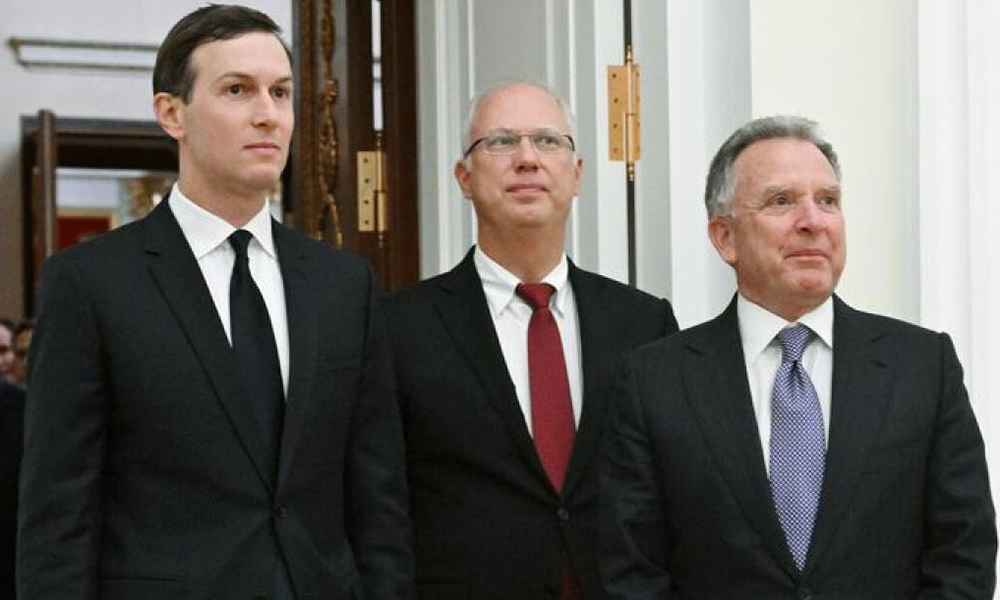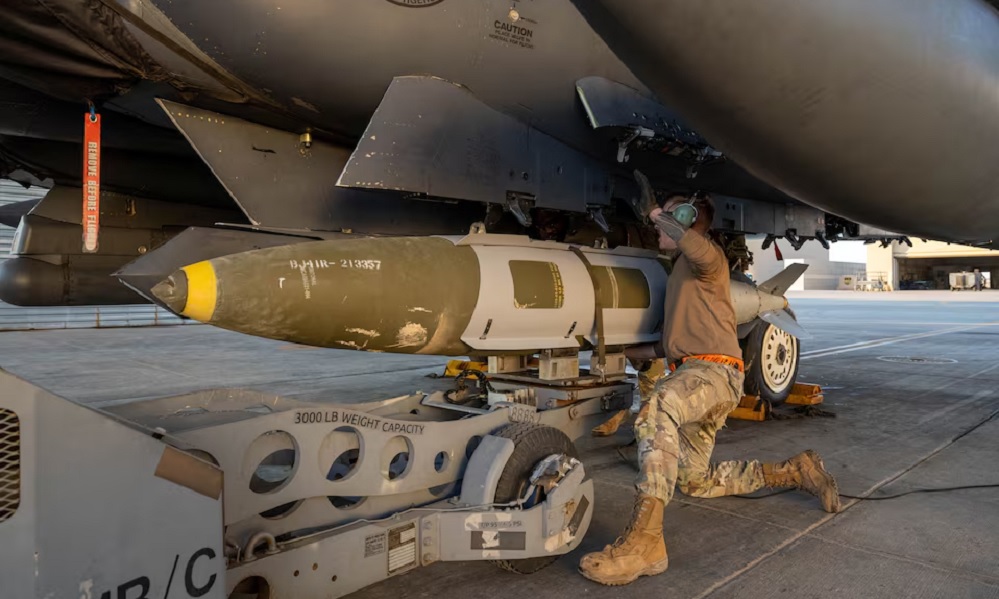World
N.Korea fires two ballistic missiles from Pyongyang airport, S.Korea says

North Korea fired two suspected short-range ballistic missiles (SRBM) on Monday from an airport in its capital city of Pyongyang, South Korea’s military reported, the fourth test this month to demonstrate its expanding missile arsenal.
Japan also reported the launch, with chief cabinet secretary Hirokazu Matsuno condemning it as a threat to peace and security, Reuters reported.
In less than two weeks, nuclear-armed North Korea has conducted three other missile tests, an unusually rapid series of launches. It said two of them involved single “hypersonic missiles” capable of high speed and manoeuvring after launch, while a test on Friday involved a pair of short-range ballistic missiles fired from train cars.
Monday’s launch appeared to involve two SRBMs fired east from Sunan Airfield in Pyongyang, South Korea’s Joint Chiefs of Staff (JCS) said in a statement.
North Korea used the airport to test fire the Hwasong-12 intermediate-range ballistic missile (IRBM) in 2017, with leader Kim Jong Un in attendance.
The missiles fired on Monday travelled about 380 km to a maximum altitude of 42 km, the JCS said in a statement.
Japanese Defence Minister Nobuo Kishi said the missiles appeared to have landed in the ocean near North Korea’s east coast, Reuters reported.
“It is self-evident that the aim of North Korea’s frequent missile launches is to improve their missile technology,” he told reporters.
“The repeated launching of North Korea’s ballistic missiles is a grave problem for the international community, including Japan,” Kishi added, noting that the launches were a violation of U.N. Security Council resolutions that ban North Korea from all ballistic missile development.
The U.S. military’s Indo-Pacific Command said it assessed that the launch did not pose an immediate threat to the United States or its allies, but “these missile launches highlight the destabilising impact of (North Korea’s ) illicit weapons programme”.
The pace of testing and the different launch sites suggests that North Korea has enough missiles to feel comfortable expending them on tests, training, and demonstrations, and helps reinforce its deterrent credibility by emphasizing the volume of its missile force, said Mason Richey, a professor at Hankuk University of Foreign Studies in Seoul, Reuters reported.
North Korea has not tested its longest-range intercontinental ballistic missiles (ICBMs) or nuclear weapons since 2017, but after denuclearisation talks stalled in 2019, it began unveiling and testing a range of new SRBM designs.
Many of the latest SRBMs, including the hypersonic missiles, appear designed to evade missile defences. North Korea has also vowed to pursue tactical nuclear weapons, which could allow it to deploy nuclear warheads on SRBMs.
World
Trump plans expanded immigration crackdown in 2026 despite backlash
The plans come amid rising public unease over aggressive tactics, including neighborhood raids and the detention of some U.S. citizens.

U.S. President Donald Trump is preparing to significantly expand his immigration crackdown in 2026, backed by billions of dollars in new funding, even as political opposition grows ahead of next year’s midterm elections.
ICE and U.S. Customs and Border Protection are set to receive an additional $170 billion through September 2029, enabling the administration to hire thousands of new agents, expand detention facilities and increase enforcement actions, including more workplace raids. While immigration agents have already been surged into major U.S. cities, many economically critical workplaces were largely spared in 2025.
The plans come amid rising public unease over aggressive tactics, including neighborhood raids and the detention of some U.S. citizens. Trump’s approval rating on immigration has fallen from 50% in March to 41% in mid-December, according to recent polling.
The administration has also revoked temporary legal status for hundreds of thousands of Haitian, Venezuelan and Afghan migrants, expanding the pool of people eligible for deportation.
About 622,000 immigrants have been deported since Trump took office in January, short of his goal of 1 million deportations per year.
White House border czar Tom Homan said arrests will increase sharply next year as staffing and detention capacity grow. Critics warn that expanded workplace enforcement could raise labor costs and deepen political and economic backlash ahead of the elections.
World
US, Russian officials meet in Florida for more Ukraine talks
Kyiv says it will not cede land that Moscow’s forces have failed to capture in nearly four years of war.

U.S. negotiators met Russian officials in Florida on Saturday for the latest talks aimed at ending Russia’s war in Ukraine, as President Donald Trump’s administration tries to coax an agreement out of both sides to end the conflict, Reuters reported.
The Miami meeting followed U.S. talks on Friday with Ukrainian and European officials, the latest discussions of a peace plan that has sparked some hope of a resolution to the conflict that began when Russia launched its full-scale invasion in February 2022.
Russian President Vladimir Putin’s special envoy Kirill Dmitriev told reporters after meeting U.S. special envoy Steve Witkoff and Trump’s son-in-law Jared Kushner that the talks were constructive and would continue on Sunday. A White House official said the talks had concluded for the day.
“The discussions are proceeding constructively. They began earlier and will continue today, and will also continue tomorrow,” Dmitriev said.
Marco Rubio, Trump’s top diplomat and national security advisor, had said he might also join the talks.
U.S., Ukrainian and European officials earlier this week reported progress on security guarantees for Kyiv as part of the talks to end the war, but it remains unclear if those terms will be acceptable to Moscow.
A Russian source told Reuters that any meeting between Dmitriev and the Ukrainian negotiators had been ruled out.
In Kyiv, Ukrainian President Volodymyr Zelenskiy said on Saturday that Ukraine would back a U.S. proposal for three-sided talks with the United States and Russia if it facilitated more exchanges of prisoners and paved the way for meetings of national leaders.
“America is now proposing a trilateral meeting with national security advisers — America Ukraine, Russia,” Zelenskiy told local journalists in Kyiv.
U.S. intelligence reports continue to warn that Putin intends to capture all of Ukraine, sources familiar with the intelligence said, contradicting some U.S. officials’ assertions that Moscow is ready for peace.
Putin offered no compromise during his annual press conference in Moscow, insisting that Russia’s terms for ending the war had not changed since June 2024, when he demanded Ukraine abandon its ambition to join NATO and withdraw entirely from four Ukrainian regions Russia claims as its own territory, Reuters reported.
Kyiv says it will not cede land that Moscow’s forces have failed to capture in nearly four years of war.
Ukraine’s top negotiator Rustem Umerov said U.S. and European teams on Friday held talks and agreed to pursue their joint efforts.
“We agreed with our American partners on further steps and on continuing our joint work in the near future,” Umerov wrote on Telegram of the discussions in the United States, adding that he had informed Zelenskiy of the outcome of the talks.
The White House did not immediately respond to a request for comment.
Rubio told reporters on Friday that progress has been made in discussions to end the war but there is still a way to go.
“The role we’re trying to play is a role of figuring out whether there’s any overlap here that they can agree to, and that’s what we’ve invested a lot of time and energy and continue to do so. That may not be possible. I hope it is. I hope it can get done this month before the end of the year.”
World
US hits Daesh in Syria with large retaliatory strikes, officials say

The U.S. military launched large-scale strikes against dozens of Daesh targets in Syria on Friday in retaliation for an attack on American personnel, U.S. officials said.
A U.S.-led coalition has been carrying out airstrikes and ground operations in Syria targeting Islamic State suspects in recent months, often with the involvement of Syria’s security forces, Reuters reported.
President Donald Trump had vowed to retaliate after a suspected ISIS attack killed U.S. personnel last weekend in Syria.
Defense Secretary Pete Hegseth said the strikes targeted “ISIS fighters, infrastructure, and weapons sites” and that the operation was “OPERATION HAWKEYE STRIKE.”
“This is not the beginning of a war — it is a declaration of vengeance,” Hegseth said. “Today, we hunted and we killed our enemies. Lots of them. And we will continue,” he added.
Trump said on social media that the Syrian government fully supported the strikes and that the U.S. was inflicting “very serious retaliation.”
U.S. Central Command said the strikes hit more than 70 targets across central Syria, adding that Jordanian fighter jets supported the operation.
One U.S. official said the strikes were carried out by U.S. F-15 and A-10 jets, along with Apache helicopters and HIMARS rocket systems.
Syria reiterated its steadfast commitment to fighting Daesh and ensuring that it has “no safe havens on Syrian territory,” according to a statement by the foreign ministry.
Two U.S. Army soldiers and a civilian interpreter were killed on Saturday in the central Syrian town of Palmyra by an attacker who targeted a convoy of American and Syrian forces before being shot dead, according to the U.S. military. Three other U.S. soldiers were also wounded in the attack.
About 1,000 U.S. troops remain in Syria.
The Syrian Interior Ministry has described the attacker as a member of the Syrian security forces suspected of sympathizing with Daesh.
Syria’s government is led by former rebels who toppled leader Bashar al-Assad last year after a 13-year civil war, and includes members of Syria’s former Al Qaeda branch who broke with the group and clashed with Daesh.
Syria has been cooperating with a U.S.-led coalition against Daesh, reaching an agreement last month when President Ahmed al-Sharaa visited the White House.
-

 Latest News3 days ago
Latest News3 days agoAfghan border forces prevent illegal entry of hundreds into Iran
-

 Latest News3 days ago
Latest News3 days agoPakistan summons Afghan diplomat over deadly attack in North Waziristan
-

 Latest News2 days ago
Latest News2 days agoAfghan health minister calls for medical cooperation between Kabul and New Delhi
-

 Latest News1 day ago
Latest News1 day agoAfghanistan signs 30-year deal for marble mining in Daikundi
-

 Latest News3 days ago
Latest News3 days agoJapan allocates nearly $20 million in humanitarian aid for Afghanistan
-

 Latest News3 days ago
Latest News3 days agoKarzai urges reopening of girls’ schools and universities for Afghanistan’s bright future
-

 Health5 days ago
Health5 days agoAfghanistan seeks India’s support in standardizing traditional medicine
-

 World5 days ago
World5 days agoUS readies new Russia sanctions if Putin rejects peace deal, Bloomberg News reports
























